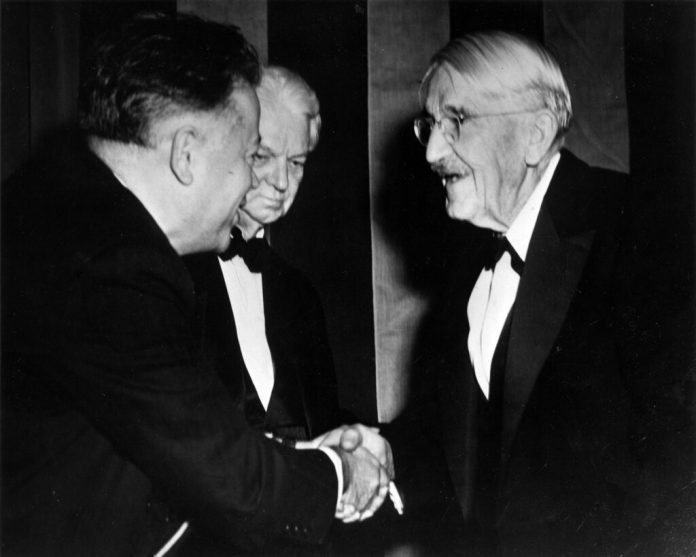No figure in American education is better known, or more notorious, than John Dewey. While Dewey’s stature today owes primarily to his philosophical achievements, he was traditionally known for his revolutionary ideas on schooling. Dewey the educational theorist has, however, been misunderstood by friend and foe alike for more than 100 years. It is important to clarify what Dewey stood for, and where his influence lies in contemporary American schooling.
Dewey was born in 1859 in small-town Vermont and received his doctorate in philosophy from Johns Hopkins in 1884. The era’s powerful intellectual currents shaped his thought. These included the historicist dialectical thought of Hegel and Darwin’s evolutionary account of man and the world. Dewey was also greatly impressed by the growing success of science (especially its manner of thinking, which he called “the method of intelligence”). If we are to understand Dewey and his impact on American education, we must appreciate the power of these ideas.
After receiving his doctorate, Dewey moved to the University of Michigan, where he became a national leader in the emerging discipline of psychology.
Because he was interested in the practical application of its principles, he also focused on pedagogy. In 1894, Dewey was invited to lead the philosophy department at the new University of Chicago. He accepted this position on the condition that he would also lead the department of pedagogy. Soon after arriving in Chicago, he opened the Laboratory School, where he could test his innovative educational theory. The school became famous, with Dewey entertaining visitors from around the world. By the time he departed Chicago in 1904, Dewey’s name had become synonymous with “progressive” thinking about education.
Largely responsible for the positive reception of Dewey’s pedagogical principles was concern over the profoundly changing social and economic environment, especially the rapid growth of cities. These developments created tensions that traditional institutions of socialization were unable to resolve but that, under the Darwinian imperative – “adapt or expire” – had to be addressed. Dewey emphasized that humanity possesses a tool for survival unavailable to other species: intelligence. What intelligence dictated was that we employ the specialized institution of schooling to develop the habits, skills, and understandings required to adapt effectively to changing circumstances. Schools, in Dewey’s vision, emerged as the premier mechanism for preserving democratic arrangements.
The schools could not execute this vision without greatly modifying curriculum and methods. Dewey insisted on reimagining the purposes of schooling as well as altering what takes place in the classroom itself.
Traditional practices such as routine conveyance of subject matter, teacher-centeredness, rote memorization, neat rows of desks, and a quiet classroom had to be abandoned because they were not only out of step with the times but also encouraged undemocratic habits and attitudes. In their place, Dewey called for a pedagogy centered on the experience and interests of the individual child. Dewey’s ideal classroom is an active place in which children are busily working together to solve problems that they themselves view as important.
After Chicago, Dewey moved to Columbia University in New York, the home of Teachers College, an institution that would become the premier source of teacher and administrator training for the nation’s rapidly expanding public schools. Most faculty at Teachers College were champions of Dewey’s new vision. Under their influence, “progressive education” flourished.
By the late 1930s, the progressive vision of education had widely prevailed.
But Dewey was not satisfied because much of what took place under this heading was not what he had called for. For example, some “progressive” schools dispensed altogether with adult guidance and prescribed subject matter. Under Dewey’s vision, adults were to remain in control, even if this control was not apparent to the children. And while Dewey did want to abandon a directly taught curriculum, the subject matter itself was to be retained, as children, under adult machination, found their own reasons to learn it. By contrast, Dewey viewed much of what became known as “progressive education” as stupid and chaotic – though his disillusionment did not prompt him to reaffirm traditional practices.
Dewey’s influence on the preparation of teachers has grown almost without opposition to the present day. Some contemporary progressives claim, incredibly, that Dewey’s ideas have never in fact been implemented. While it is true that the complex practices entailed by Dewey’s sophisticated pedagogical principles are seldom fully established, diluted versions of them are ubiquitous. Teacher certification, for example, is dominated today by standards and practices whose origins lie in Dewey’s revolutionary influence.
In this sense, Dewey has been so successful that his many pedagogical descendants hardly even notice his influence. While Dewey would object to much that is done in the name of ideas of which he was the original author, he can still be held responsible for the results. He remained stubbornly committed to his vision, despite the consequences of its implementation.
Jon Fennell is Professor Emeritus of Education and former Dean of Social Sciences at Hillsdale College. This overview of John Dewey is based on his in-depth interview with Hillsdale College’s K-12 classical education program. Originally published by RealClearEducation. Republished with permission.








